QuestionQUESTION: My husband found two kittens at his work that were abandned me and another of his co workers both took one home each. my baby girl is smaller then her brother. ive seen so much information on different websites most tell me opisit things. my main question is about her pooping. she eats formula and she pees alot but never seen her poop. i stimulate her and everything. the vet says sometimes kittens on formula dont poop. is this true? should i be worried? her tummy isnt bloated until after she eats. please help
ANSWER: Stephany,
On formula, most kittens do not poop more than once a day, if that often. Are you feeding enough? Is she gaining weight? How long have you had her.
If she has gained weight and is rolly poly, at 4 weeks, I would begin the weaning process with her.
Here is some general information on feeding orphan kittens:
To see if your kitten is doing well as you hand raise her, we like a digital postal scale for weighing kittens. Newborns should gain about 1 oz (30 g) in the first week and nearly 2 oz (50g) in each subsequent week until weaning. A good feeding regimen for kittens is 4 times a day (e.g. midnight, 7:00 AM, 1:00 PM, 7:00 PM).
You can get good kitten milk replacer products, e.g. Justborn or KMR. Until she gets her strength, you may want to add a bit of unflavored Pedialyte to the formula (about one part formula to one part Pedialyte for the first couple of days).
If she will nurse from a pet nurser, this is preferable. Otherwise you will have to tube feed, and your vet can show you how.
If you are tube feeding, she should take about .3 oz (8-10 mL) of formula for every 4 oz (100 g) of body weight. Divide this by 4 to get an idea of how much to feed each time. Before you feed each kitten, make sure you push enough formula through the tube so that there is no air in the tube when you begin feeding. If the mixture is too rich or the kitten is being overfed, they can get diarrhea.
If she is taking formula from a pet nurser she should take what you would tube feed on her own. If she does not seem to drink enough, wait a few minutes and try again.
Whether you are tube or pet nurser feeding, make sure the formula is warm on the back of your hand before giving it to the baby. In both cases watch out for over feeding. This can cause diarrhea and, worse, if a baby regurgitates it can aspirate the formula leading to pneumonia!
Once each baby has been fed, you can potty her. She should pee each time and poop once a day. To potty the kitten get a soft tissue or cloth and gently stimulate the genital area, it will potty. You can burp each baby by holding it upright and gently tapping on its back. With tube feeding, it should not get much air, so you may not hear any burp."
Please get back to me if you have more questions and let me know how the little girl is doing. Hand reared kittens are always a challenge and it does not always work out.
If you need information on a weaning process, please get back to me on that, also.
Best regards... Norm.
---------- FOLLOW-UP ----------
QUESTION: Shes doing great. gaining weight at a good rate. litter training is hit and miss. im wondering if there is an easy way to litter train her. as well as she refuses the bottle and drinks formula out of a bowl. would this be a good stage to start weaning? how do i go about it. thank you so much for your last answers.
AnswerStephany,
I am glad to hear she is doing well. I would not worry about the litter pan as she will get the hang of it, especially after she is on solid food. One trick you can do is, if you get some poop from her by pottying her, put it in the litter pan. Likewise, you can rub some of her [pee on the inside bottom of the litter pan. This will help her understand what its purpose is. After every feeding, we put our kittens in a litter pan. We usually have a couple of small litter pans spread out in the kittens' living area. since, sometimes, when they have to go, they could be too far away from a single litter pan.
I would say you can start weaning her now. I would start her with a little bit of a good strained meat baby food #only ingredients should be strained meat and broth or gravy, no added salt, no added onion or garlic#.
You can put a little in her mouth and let her eat it. She may spit it out, but, in time, she will eat it. Once she chows down on the baby food, I would cut her formula way, way back. It usually takes about three days to a week for kittens to take to the baby food. Let her eat as much as she wants. Once she is eating the baby food pretty well, you can begin to move her to cat food by putting a tiny bit of cat food in with her baby food. Keep upping the amount of cat food and lessening the amount of baby food. By 6 weeks of age she should totally be eating cat food.
At 8-9 weeks she can get her first shot from the vet. Usually, this is against rhinotracheitis, panleukopenia, and calici virus. If she is indoors, she will not need a FeLV (Feline Leukemia Virus) shot. By 11-12 weeks of age she can get the rhinotracheitis, panleukopenia, and calici virus booster shot. She should have 3 weeks in between shots. If Rabies is required in your area, you should wait at least 3 weeks after the rhinotracheitis, panleukopenia, and calici virus booster to get her inoculated against Rabies. Your vet should use an adjuvant free vaccine and give it in the thigh muscle. If your vet does not agree with this, I would look for another vet!!!!!!!!!!
Please let me know if you have any questions.
Best regards... Norm.

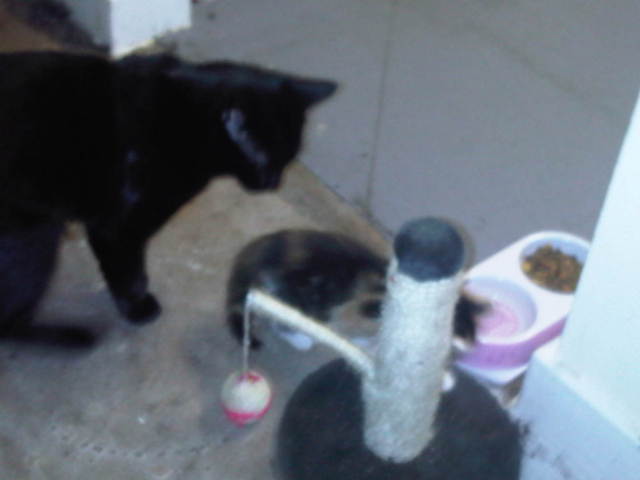 Cat keeps biting neck of new kitten
Question
my babys
Hiya I have adopted a new kitten (fem
Cat keeps biting neck of new kitten
Question
my babys
Hiya I have adopted a new kitten (fem
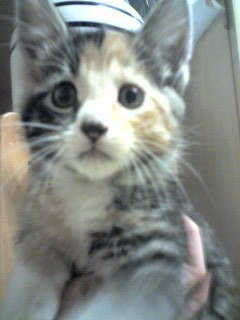 my first kitten
QuestionQUESTION: hi im just wondering if u know what k
my first kitten
QuestionQUESTION: hi im just wondering if u know what k
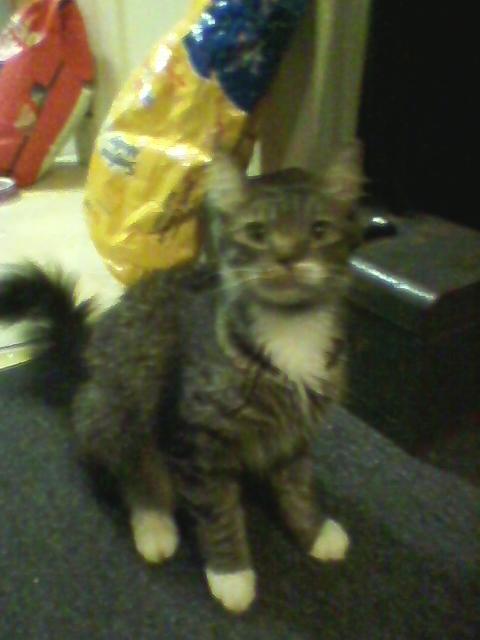 cat identification
Question
pic was from my phone,
i am currently f
cat identification
Question
pic was from my phone,
i am currently f
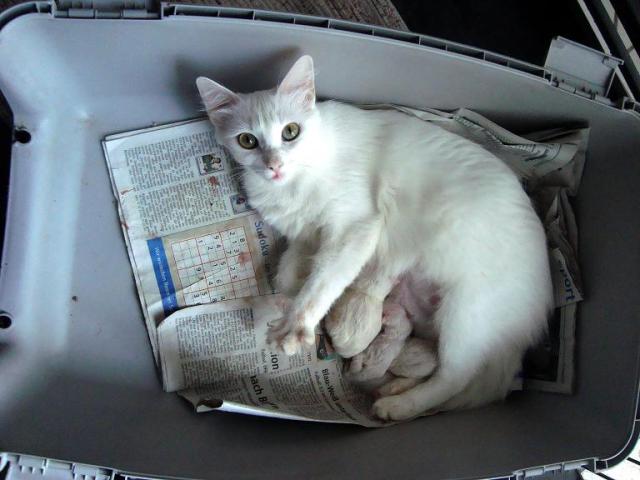 Feline Nutrition
QuestionQUESTION: I also rescue feral cats and kittens
Feline Nutrition
QuestionQUESTION: I also rescue feral cats and kittens
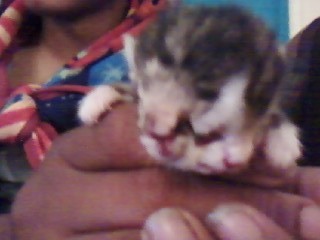 my cat had a kitten with one head and part of another with a mouth and has not nursed since she was born.
Question
my newborn kitten
my cat delivered a female ki
my cat had a kitten with one head and part of another with a mouth and has not nursed since she was born.
Question
my newborn kitten
my cat delivered a female ki